Ian Redmond, biologist and conservationist
As a wildlife conservationist, I am not often in environments like this. However, Clwyd invited me and I was intrigued by what I had heard. Upon arriving and seeing the work being done here, I understand the purpose of my visit. We are working to do as much good as possible, in line with Dan's ambition. The universe may be vast, but my focus is on the biosphere - the thin layer of life on our planet. Many people speak of the desire to save the planet, but the biosphere is truly the foundation of all life on Earth.
"The planet is a ball of rock, ain't going to go anywhere, sit round around the sun, but the thin film of air and water in which we live, that's the bit that we need to focus on."
Documentaries don't tell the truth
Many of you may have an interest in natural history, perhaps by watching documentaries on television. These documentaries often give the impression that much of the world is in good shape. However, this may be because the mainstream media does not want to depress or frighten viewers, who may instead choose to watch more enjoyable forms of entertainment such as game shows or sports. In reality, the state of the world may be direr than is depicted in mainstream media. By the end of this discussion, I hope to provide an alternative way for you to stay informed about the world around you.
What is the IPBES-6
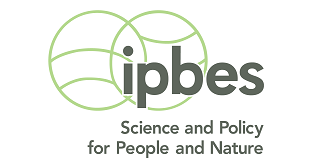 Last week, representatives from around 100 countries gathered in Colombia for IPBES-6. Many of us may be unfamiliar with this acronym, just as we may be unfamiliar with the Intergovernmental Panel on Climate Change (IPCC). These organizations deal with global issues such as the environment and climate change but often work on a very local level. IPBES is the equivalent organization for biodiversity and ecosystem services.
Last week, representatives from around 100 countries gathered in Colombia for IPBES-6. Many of us may be unfamiliar with this acronym, just as we may be unfamiliar with the Intergovernmental Panel on Climate Change (IPCC). These organizations deal with global issues such as the environment and climate change but often work on a very local level. IPBES is the equivalent organization for biodiversity and ecosystem services.
Biodiversity refers to the variety of life on our planet, while ecosystem services are the benefits that nature provides to us. It is important to maintain the biosphere, the thin layer of life on Earth, to sustain these ecosystem services. The atmosphere may seem to extend far from the surface of the planet, but in comparison to the size of the Earth, it is just a thin film, like a clingwrap. We live within this film, on the surface of the Earth.
David Attenborough and gorillas
So, I'm talking to you as someone who has had some wonderful experiences in life. The thing I like most about the inbound slides you just be looking at is that it ends in delight. Delight. You want to delight your customers.
"My customers are everyone on the planet and I want to share my delight".
Because when I graduated from university with a very, very mediocre degree, I had the extraordinary good fortune to get the job, the volunteering job, no pay, of assisting Dian Fossey. Dian became famous because her life's work was made into a movie called Gorillas in the Mist.
Not only did I eventually get to meet Sigourney Weaver and teach her how to swell like Dian Fossey, how to groan like a gorilla. But while I was working with Diane, I got to introduce David Attenborough to the gorillas.
So, if you've seen the Life on Earth sequence, you know, that is the peg on which people tend to hang me. I've done a few other things in the past 40 years, but that's what people remember. And they remember it because David was delighted. Certainly, it wasn't planned that Pablo, a juvenile gorilla, would come and sit in his lap and squirm all around and he was trying to talk about the opposing thumb, which is what makes primates different from animals that can't hold stuff.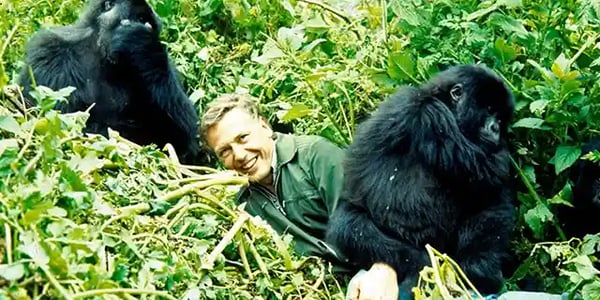
We have an opposable thumb, very useful, not just we humans, most primates have an opposable thumb, so that moment of delight of David Attenborough sitting surrounded by gorillas and even being played with, it wasn't so much playing with them, but they were certainly investigating him, was just sheer natural delight and that made a lot of people interested in gorillas.
What is a "being"
If you have been fortunate enough to encounter gorillas, chimpanzees, orangutans, or other non-human beings, you may be familiar with the term "human beings". However, it is important to recognize that "human" and "beings" are separate words and have different meanings. A being is someone who has a sense of self and an understanding of their place in the world.
Many animals, such as gorillas, elephants, whales, and dolphins, have evolved to have large brains and complex societies, allowing them to have this sense of self. They behave in ways that improve their standing in their societies and increase their chances of reproducing, passing on their genes to future generations. These actions have ultimately led to the development of human beings and other beings as we know them today.
A different kind of marketing is needed
So, human beings are so successful perhaps because of your wonderful marketing techniques.
"We are depleting the resources of our planets, we're using up the resources of our planet at a rate that is unsustainable".
Businesses need to consider the sustainability of their practices, rather than solely focusing on growth. While it may be admirable to aim to be the fastest-growing company that sells socks, it is crucial to ensure that the materials used to make the socks are sourced sustainably. If a company's actions have a larger impact on the environment than the planet can sustain, it will eventually run out of resources and cause problems. Businesses need to consider their environmental footprint and strive for sustainable practices
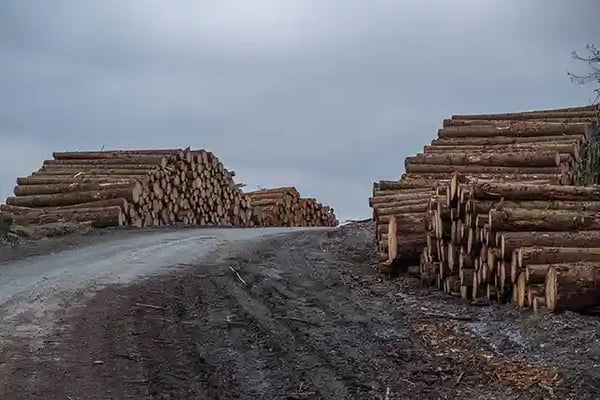
For much of human history, we have perceived ourselves as small beings on a vast planet, believing that our impact could not be significant enough to change the world on a global scale. However, the Intergovernmental Panel on Climate Change (IPCC) has demonstrated that our actions can have a significant impact on the environment. As a result, many governments, including those of most countries except for the incumbent in the White House, have recognized the need to reduce greenhouse gas emissions and strive for sustainable development.
The United Nations has also established goals to curb excesses and live within the energy budget of our planet. While these issues may seem distant from the concerns of gorillas or marketing, they are all connected and important to consider.
The scary results of the IPBES
So, IPBES (Intergovernmental Panel on Biodiversity and Ecosystem Services) had its sixth meeting last week and the conclusion was - which you probably wouldn't have found in the headlines of your papers because maybe it's too depressing or maybe just it's too many acronyms and nobody's interested - the conclusion is that we're in real trouble. Most of the focus is on conservation in my professional life, and I didn't set out to be a conservationist, I'm a naturalist. I delight in nature and I wanted to spend a life studying and photographing and filming and getting to understand nature. But the 40 years that I've been doing that has been the 40 years when we've seen animal populations crash and those that have come to a point where they are endangered or critically endangered or disappear, get a lot of attention. And you look at the conservation literature and you see people saying:
"I don't want to live in that world. I don't want my children to grow up in a world where there aren't elephants, because elephants are wonderful".
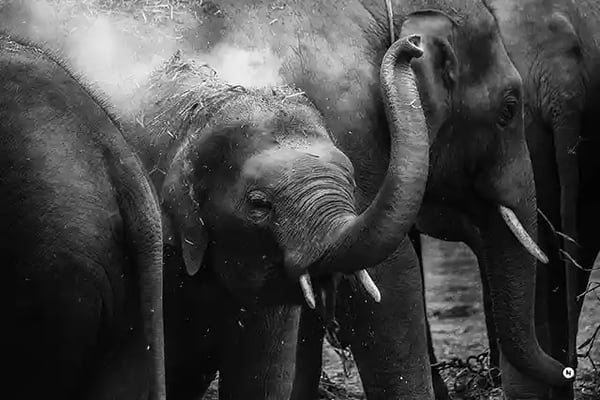
I completely agree that elephants are incredible animals, and it would be a great loss if future generations were to live in a world without them. While some may recognize that it would be sad to lose elephants simply because they are nice, it is important to consider the broader ecological consequences of their disappearance. There were once an estimated 10 to 20 million elephants in Africa, but now there are fewer than half a million, a loss of 95-97%. As ecologists study the interactions between animals and plants, it is clear that the loss of such a significant portion of the elephant population would have far-reaching impacts on the ecosystem.
Why elephants are important
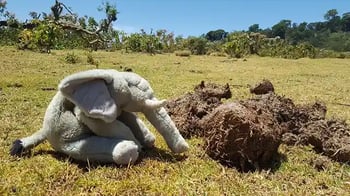
I am sorry that I did not bring a bowl of elephant dung to show you today, but if you visit my Twitter feed (@4apes), you will see a photograph I took last month of Archie, an elephant, next to a ball of dung. Elephants are truly remarkable creatures and it would be a great loss if future generations were to live in a world without them. As the largest living land animals, they are herbivores and consume a significant amount of plant matter each day, resulting in a correspondingly large amount of dung. Each elephant produces approximately one metric ton of first-class organic manure each week.
This manure is especially valuable if the elephant has been feeding on seeds or fruit pods, such as those of acacia trees or forest fruits. Elephants have a highly developed sense of smell and use their trunks, which are similar to a human nose, to grasp and manipulate objects with great precision. They can locate the best sources of food and extract seeds and fruits with ease. The dung produced by elephants serves as a valuable source of nutrients for other plants and animals in the ecosystem, making them an important part of the web of life on Earth.
We must work to protect and preserve elephant populations, not only because they are interesting and majestic creatures, but also because of the vital role they play in maintaining the balance of life on our planet. We must consider the broader ecological consequences of our actions and strive to live in harmony with nature, rather than exploiting and degrading it
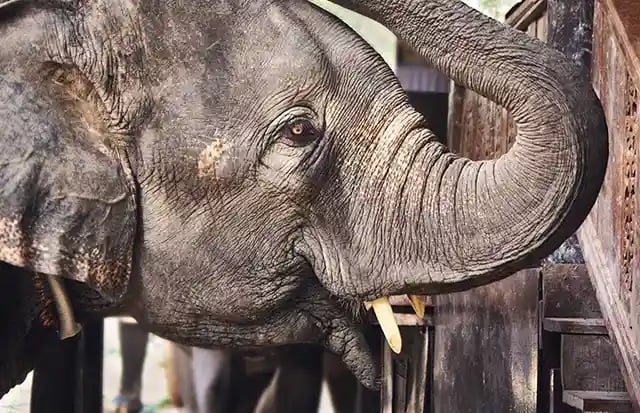
If you were an elephant, you would approach your food much like you might at a buffet, using your sense of smell to locate and select the best options. Elephants have an opposable thumb on the end of their trunk, which they use to grasp and manipulate food, bringing it to their mouth to eat. They spend much of their day foraging for plants and producing large quantities of dung, which is rich in nutrients and helps to fertilize the soil.
Many tropical tree seeds are adapted to pass through the digestive systems of animals, such as primates, birds, elephants, and tapirs, to germinate. These seeds have a protective coat that must be scarified or damaged to allow moisture to enter and facilitate germination. Elephants are particularly effective at dispersing seeds, spreading them further and wider than any other animal. This helps to ensure that the seeds of many species have the opportunity to germinate and grow, even if not all of them reach adulthood. The elephant's role in dispersing seeds and providing food for other herbivores is an important ecosystem service, contributing to the balance of life in the environment
The elephants are at risk of extinction
So, I mentioned that perhaps
"A century ago there might've been 10 million elephants and now we've got fewer than half a million."
The role of animals like elephants, which have been referred to as the "mega gardeners of the forest," is crucial to the health and functioning of the biosphere. These animals disperse seeds, helping to ensure that new plants have the opportunity to grow and thrive. The loss of 95% of these "gardeners" would have far-reaching consequences for the ecosystem. If you have a few spare minutes and are interested in learning more about this topic, I encourage you to watch my TED talk titled "Gardeners of the Forest" or search for the hashtag #GardenersOfTheForest on Twitter or Facebook to find additional articles and videos on the subject.
It is not just the loss of interesting and charismatic species that is a concern, but also the vital services they provide to the environment. The IPBES report highlights the importance of recognizing the value of all species, not just the larger ones, in the functioning of the biosphere.
.
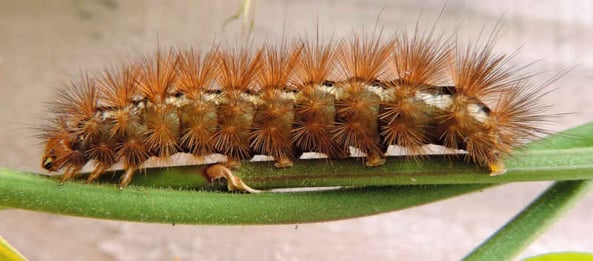
As an ecologist, I am always amazed by the role that even the smallest creatures can play in the health and functioning of an ecosystem. Take, for example, the humble caterpillar. While they may seem insignificant at first glance, the combined weight of a group of caterpillars can be greater than that of elephants. These little creatures munch away on plants, converting them into nutrient-rich packages that are scattered throughout the forest in the form of faeces, or what some ecologists refer to as the "rain of faecal droppings."
This may not sound particularly appealing, but the nutrients in caterpillar faeces are vital for the health of the forest ecosystem. They are used by fungi, microbes, and other plants, eventually returning to the soil and helping to nourish new growth. Trees, in particular, are incredibly important for life on Earth. Through the process of photosynthesis, they capture carbon dioxide and release oxygen, creating the breathable air that we rely on for survival.
When you walk into a forest, you can't help but be struck by the beauty of the trees and the refreshing atmosphere they create. The cool, crisp air and the sense of peace and tranquillity that a forest provides are all thanks to the complex web of life that exists within it, including the seemingly insignificant caterpillars and their valuable contribution to the ecosystem.
Introduction to vEcotourism.org
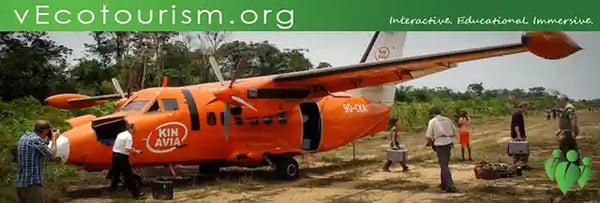
Recently, I had the opportunity to work with a team called vEco (vecotourism.org) and try out a new tool for exploring and experiencing the natural world. While many people are fortunate enough to travel to these beautiful and unique habitats, the majority of the population will never have the chance to visit them in person. However, through the use of technology and eco-tourism, we can help bring these environments closer to people and help them understand the importance of preserving them for future generations.
Conservation efforts often rely on the support of tourists and the dollars they bring, but we must find ways to engage and educate a wider audience about the value of these ecosystems. By sharing our experiences and showcasing the beauty of these habitats, we can inspire people to take an interest in the health and well-being of the planet and work towards protecting the natural world for future generations
Enlightening people
So, how do you convey that delight, which I and a few other lucky people get to experience firsthand to other people so that they share your enthusiasm for protecting it? Well, I think the key phrase in conservation is "enlightened self-interest". If you can enlighten people as to why it's important for them, that these things continue, the habitats that were trying to protect, continue to remain healthy. It's in their self-interest and the children's interests, in the grandchildren's interests.
"We want to live on a healthy planet".
And one of the things which are coming out of all these ecological studies is that:
- The health of an ecosystem like a tropical rainforest depends on the animals. And what has come out of the climate talks and all the research that has gone through and informing those talks, the intergovernmental panel on climate change is that:
- We are not going to win the battle against climate change if we don't win the battle against deforestation, because we need forests all over the world, but especially in tropical forests.
And then I'm going to do the Google event now and type in "T341". There we go. I don't know what somebody else used utilizing "T341" when I wanted to show you this one. Can we, there's a full screen. Play the video.
Global Weather Patterns
What you are seeing here is a powerful tool for illustrating the importance of tropical forests and the crucial role that animals such as elephants, primates, and toucans play as the "gardeners" of these forests. This animation shows global weather patterns, with white representing water vapour and orange representing other forms of precipitation. If you look closely, you will see that the precipitation in the Congo Basin is pulsing, with the hours and days passing by at a rate of approximately one day per second.
Rainforests like the Congo Basin not only receive rain, but they also generate it. The vegetation and ecosystems within these forests play a vital role in regulating global weather patterns and ensuring a consistent supply of rain. We must work to protect and preserve these ecosystems to maintain the delicate balance of the planet's natural systems.
"Evaporate, transpiration, the transpiration of water from the roots and the evaporation from the leaves puts water into the atmosphere."
My colleagues at the Global Canopy Programme at Oxford have estimated that a unit area of tropical rainforest releases 8 to 10 times more water vapour into the atmosphere than the same area of the ocean. This moisture is a key driver of global weather patterns, which can be tracked as they move across the planet. These patterns are particularly influenced by the daily rainfall in the Congo Basin, Amazon, and Southeast Asia, which are home to some of the world's most complex rainforests. It is interesting to note that these areas also have high concentrations of primates, including humans.
We rely on these global weather patterns for our survival, making it essential that we protect and preserve these vital ecosystems.
Why tropical forests are important

As we all know, a nice glass of wine can be a delightful experience. Whether you prefer a South African wine or one from France, California, or New Zealand, you may be interested to know that the rain that nourishes the vines in those regions can be traced back to specific sources. By using mapping and tracking techniques, we can see how water vapour travels west from Africa to the Amazon, then hits the Andes and sweeps around to water the vineyards in South Africa. Similarly, storms in Australia and New Zealand contribute to the global water cycle, which functions like the three chambers of a heart, pumping water around the planet.
However, if we continue on our current trajectory and reach an average global temperature increase of four degrees, computer models predict that Sub-Saharan Africa, the Amazon Basin, and Southeast Asia will become arid. This would have disastrous consequences for the biosphere, as we know it, and make life extremely difficult for us. It would also affect the availability of water for our dams and cities, as well as the supply of clean energy from hydroelectric plants, which rely on aquifers for their water.
Ethology and animal behaviour
It is alarming to hear about the findings from the Intergovernmental meeting in Columbia last week, which unfortunately received little news coverage. Perhaps this is because people prefer not to be confronted with disturbing information, but we must face these challenges and change our behaviour to address them.
As an ecologist, I am fascinated by the study of behaviour, both in animals and in humans. We are animals ourselves, and we must understand and learn from the behaviour of other species, particularly those like gorillas and elephants that may seem intimidating.
Fifty years ago, Dian Fossey made a significant breakthrough in our understanding of gorillas and how we interact with them. It is now 50 years since her work began, and it has had a profound impact on the relationship between humans and gorillas. It is important to remember that gorillas, along with chimpanzees, bonobos, and orangutans, are all our cousins in the larger family of primates, sharing a common ancestor with us.
"Understanding our cousins [gorillas] is fascinating for us because we are very self-obsessed species. We tend to think in anthropocentric ways where humans are at the center."
As humans, it is natural for us to prioritize our own needs and desires above those of other species. However, if we come to realize that the well-being of other species is essential for our survival, perhaps we will be motivated to act in our enlightened self-interest and work to protect gorillas and elephants in the Congo Basin. These animals play a vital role in maintaining the global water cycle, which in turn keeps our vineyards watered and producing the wine that we enjoy. It is a shame, however, that none of the money we spend on a bottle of wine goes towards protecting the forests that drive these weather patterns and support the health of the biosphere.
We have to change our economy
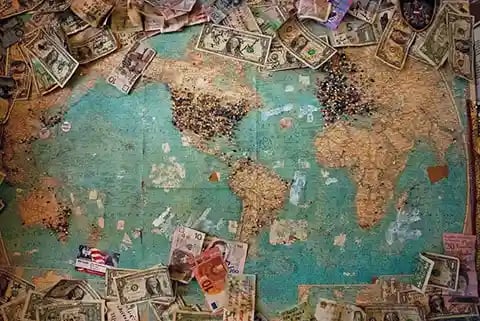
Preserving and protecting tropical forests is a massive undertaking that will require significant financial resources. Unfortunately, the prospect of billions of dollars being invested in these efforts can attract individuals and organizations more interested in financial gain than in preserving the forests themselves. The United Nations' REDD+ program, which aims to reduce emissions from deforestation and forest degradation, has had some successes in certain areas, but it has also faced challenges due to corruption.
Human greed and exploitation can often have detrimental effects on the least influential and marginalized members of society, such as indigenous people who live in forests. These individuals may not have legal documentation to prove ownership of their land and are therefore vulnerable to being displaced by mining companies, plantation owners, and loggers seeking to exploit the resources of the forest.
We in the developed world, who often consume products derived from these forests, are also complicit in this process and have a responsibility to consider the impact of our actions on the environment and the people who depend on it.
"I don't want to make you feel bad. I want to make you feel: 'I can do something about that'".
We are part of that problem
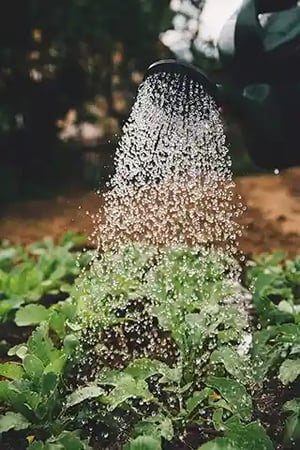
We must ensure the sustainability of the products we consume and the industries that produce them. Overconsumption and unsustainable practices are damaging the biosphere and our long-term prospects for survival. It can be challenging to communicate the importance of these issues to people, especially when they are drawn to the charismatic appeal of animals like gorillas. However, it is important to remember that the ecological impact of a family of gorillas is roughly equivalent to that of one elephant, and both species play important roles in seed dispersal and the health of African forests.
As influential individuals, it is up to us to use our platforms and our ability to build trust with others to promote sustainable practices and protect the biosphere. I encourage you to use these methods and continue to make a positive impact on the world.
The Story of Dian Fossey
Before Dian Fossey's work, gorillas generally viewed humans as frightening and dangerous creatures. When frightened, gorillas will usually try to run away, but if humans persist in following them, the situation can become dangerous. Silverback gorillas, in particular, are extremely large and powerful animals, with long canine teeth. They are strong enough to be a match for several humans in terms of weight and strength.
Dian Fossey, an occupational therapist from Louisville, Kentucky, was allowed to study gorillas and used her experience working with children who were frightened and introverted to develop methods for building trust with these animals. Her work has had a lasting impact on our understanding and relationship with gorillas.
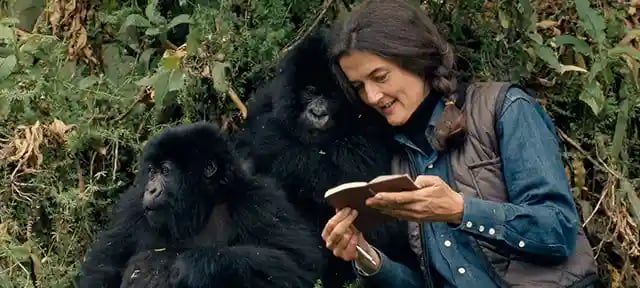 She was a tall, gangly woman, very self-conscious, her human self-deprecating too, because of self-consciousness. But when it came to winning the trust of someone who was frightened, she was brilliant and she learned how to win the trust of wild gorillas to the point that now 10 years later when David Attenborough and the BBC crew came out, they were able to come out with me and see the gorillas and the gorillas didn't run away more than that. They came and interacted with the film crew.
She was a tall, gangly woman, very self-conscious, her human self-deprecating too, because of self-consciousness. But when it came to winning the trust of someone who was frightened, she was brilliant and she learned how to win the trust of wild gorillas to the point that now 10 years later when David Attenborough and the BBC crew came out, they were able to come out with me and see the gorillas and the gorillas didn't run away more than that. They came and interacted with the film crew.
Now, if you go and see gorillas in Rwanda, I hope you will please respect the 7-meter distance: we try and keep people seven meters from the gorillas because if you cough over them or sneeze over them, you might infect them with a human germ to which they have no immunity and like more serious for them. So that's an important, you know, the days of a baby gorilla playing on a visitor. We have to put a stop to that because there are thousands of visitors now and it's been a success.
The one success story in the conservation of species that I'm involved with is the mountain gorilla. Every year at the end of the year, there are more mountain gorillas in the world at the beginning of the year and numbers of recovering because of intense conservation work, and it was Dian was primarily the whistle-blower and the one who enabled that to happen. Every other kind of ape is decreasing apart from the human species.
"Elephants across Africa, across Asia are decreasing and as we lose them, we lose the work they do in that ecosystem."
And as we're increasingly aware of global climate stability, we need those ecosystems. It ain't a luxury. It's not "Oh, it'd be nice if you can say some good because we can go and see them on holiday". It's "oh, how many gorillas have we got enough to keep doing the job that they've done to maintain this in climate stability that we're aiming for?"
The Ape Alliance
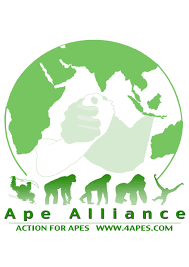
There are several ways in which we can work to raise awareness about the importance of apes and the need for their conservation. One of these is through websites like 4apes.com, which provides information and resources on this topic. Another is through the Ape Alliance, a coalition of around 100 NGOs from around the world that I chair. The Ape Alliance works to promote the conservation of apes and change the way they are perceived by people in the Western world, where they are often viewed as entertaining clowns or performers in circuses.
Unfortunately, this attitude towards apes is still prevalent in other parts of the world, such as China and Southeast Asia, where they are often forced to perform tricks and wear clothes in circus shows. This drives demand for baby apes to be taken from their families, which can result in the deaths of multiple individuals in a group, such as gorillas or chimpanzees. It is crucial that we work to combat this exploitation and raise awareness about the importance of protecting apes and their habitats.
"We have to stop that because they have work to do in the forest and because the intelligent social mammals, self-aware beings like ourselves."
The initiative "Bike That Helps Save Gorillas"
So, the "Ape Alliance" is doing this and if you go to YouTube, which I wouldn't do now, and look for the "Bike that helps save gorillas", you will see a nice little ad and a video which shows you how a pedal power cinema, because the people we need to convert the people who live next to the forest and often they're miles from the nearest power supply, but if you take a bicycle and a generator projector, the kids in the schools can generate the power to see the films and it's wonderful and watching for the first time behaviour on a screen.
They are delighted. They're humans like us and they see something and they are delighted and the parents come into the holes that we show these in are packed and people pouring through the window and lines of people outside the window looking over the shoulder of the person in front who's trying to see a chink of the moving pictures because they live in a world where there is no moving picture. There is no cinema, no TV.
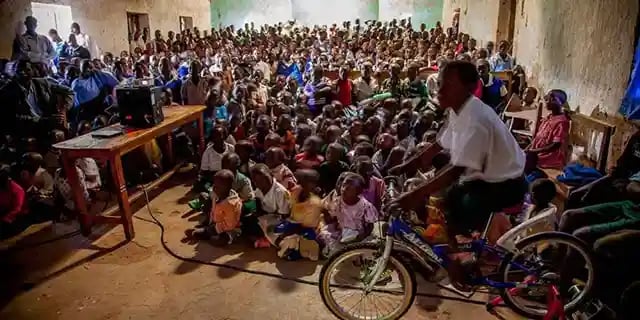 So, it's really powerful and the message is not "Human, stop doing this", but "Wow, look at that!". That's the reaction you get. And Jillian Miller, who runs the gorilla organization, based in Primrose Hill, tells a story about being at the back of the hall and one of the mothers coming in with her baby in her arm and she's watching a film of a gorilla feeding her baby and it's obvious it's the same behaviour. Crooked the arm, head in here, hold it to the breast.
So, it's really powerful and the message is not "Human, stop doing this", but "Wow, look at that!". That's the reaction you get. And Jillian Miller, who runs the gorilla organization, based in Primrose Hill, tells a story about being at the back of the hall and one of the mothers coming in with her baby in her arm and she's watching a film of a gorilla feeding her baby and it's obvious it's the same behaviour. Crooked the arm, head in here, hold it to the breast.
And she says "Oh, that's my sister!". You don't need someone saying "We must don't kill gorillas". She just saw, and her husband was a hunter. She said, "Right, I'll be having words with my husband". That's how you win people across. So many people are more sophisticated than that. They've got the Internet, they can watch videos, but videos are very passive. You sit there and you watch.
Show the real world in a virtual way
Another project that I am involved in is vEcotourism.org, which aims to introduce virtual ecotourism experiences to the public. With the widespread use of virtual reality headsets, we can use this technology to allow people to experience real-world environments interactively. By visiting the website, people can take virtual tours of various locations and even download apps like the "Ape App VR" developed by the United Nations, which allows users to visit all the species of great apes using a VR headset. We also developed the "Gorilla Safari VR" app in collaboration with the Born Free Foundation, which allows users to experience a virtual safari to see eastern lowland gorillas in their natural habitat.
This type of virtual ecotourism can be especially exciting for those who may not have the opportunity to visit these locations in person, or for those who want to experience these environments in a more immersive way. For example, you can virtually visit the same locations and see some of the same scenes as those featured in documentaries like Gordon Buchanan's "Gorilla Family and Me", which aired a few Christmases ago. By using virtual reality technology, we can bring the beauty and importance of these natural environments to a wider audience.
Introduction of EcoStreamz
As I mentioned earlier, it can be difficult to get documentaries about important issues in mainstream media. That's why I want to introduce you to Ecostreamz.com, a platform for films and documentaries that aim to make a difference. With the proliferation of media content on smartphones and other devices, people are used to getting their media in short, bite-sized clips. However, if you want to understand a problem and take action on it, it can be hard to find the resources to do so. That's where Ecostreamz comes in. It's an upgrade to a channel that allows you to watch films and documentaries on your television but with a focus on environmental and social issues.
While many people are willing to pay for subscriptions to sports or music channels, we believe that some people may also be willing to pay to learn about what is happening in the world and how they can make a difference. That's why we created Ecostreamz.com, and we encourage you to consider subscribing to this platform. By engaging with films and documentaries that aim to make a difference, we can work together to create real change in the world.
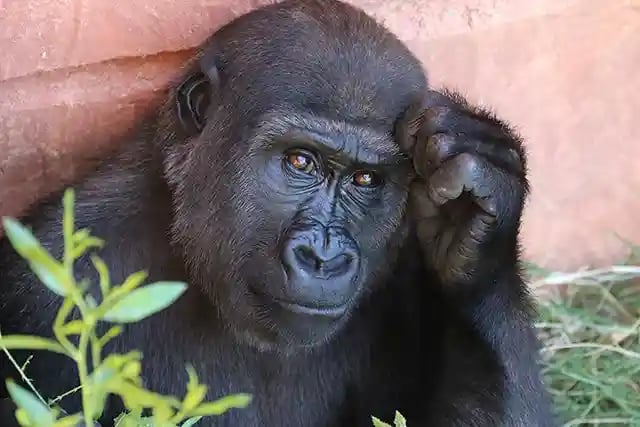
Conclusion: what can we do?
So trying to make the universe a better place, is a big task, "The biosphere that's within our grasp".
"We can all visit every part of the biosphere and care about it and if we're talking to people who can't, we can use virtual reality."
We can use modern technology to inform them so that they are both delighted and it's in their self-interest to change that bit of behaviour that might be contributing to the problem.
So certified products, FSC, wooden paper, sustainable palm oil plantations that are not replacing natural forests, marine stewardship council fish. When you go for your fish and chips, don't buy it if you can't be sure that it's from a well-managed fishery.
That's what we all have within our power to do because the pound in our pocket or the dollar in our pocket is what's driving these processes. So, we are the power and I'm so excited to learn about these new methods of reaching people, winning their trust and then delighting them because then we will have a delightful audience and consumers who are using their money to do good rather than being unwitting, unwittingly part of the destruction of our biosphere. That was rather longer than you anticipated. Sorry, there's lots more online, but thank you so much for the opportunity to talk to you.


